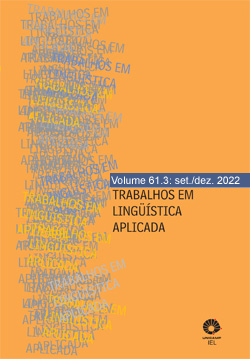Resumo
Este artigo é baseado numa pesquisa de caráter sociolinguístico e etnográfico, que foi feita com migrantes de Timor-Leste numa pequena cidade na Irlanda do Norte (CABRAL; MARTIN-JONES, 2017). Através desta pesquisa, traçamos as suas trajetórias de migração (via Portugal ou Inglaterra) e documentamos os modos agentivos que eles encontraram para lidar com as condições de estabelecimento e de emprego e, ao mesmo tempo, de criar novos espaços de solidariedade e convivialidade nos mundos da vida locais. Aqui, focamo-nos em um mundo em particular – o do desporto – e nos nove clubes de futebol formados para homens e jovens timorenses naquele contexto irlandês. Descrevemos e analisamos três aspetos diferentes de práticas de comunicação que se desenvolveram à volta do futebol: (1.) as práticas linguísticas, culturais e semióticas envolvidas na escolha de nomes e “marcas” (branding) para os clubes, em especial, práticas que indexavam diversas identidades timorenses (de diferentes regiões de Timor-Leste) e que indexavam diferentes mundos culturais e globalizados de futebol; (2.) os recursos linguísticos dos “treinadores” dos clubes (inclusive Tétum, Português e Inglês), as suas práticas de organização, os seus sistemas de valores e os seus fundos de conhecimento; (3.) o sentido da programação dos torneios de futebol em torno de datas importantes na construção da nação de Timor-Leste – uma prática regular evocava uma orientação para uma identidade nacional partilhada.
Referências
ADEY, P. (2006). If mobility is everything then it is nothing: towards a relational politics of (im)mobilities. Mobilities, v. 1, n. 1, p. 75-94.
AHMED, S.; CASTANEDA, C.; FORTIER, A.M.; SHELLER, M. (eds.). (2003). Uprootings/ regroundings: Questions of home and migration. Oxford: Berg.
APPADURAI, A. (1996). Modernity at large: Cultural dimensions of globalization. Minneapolis: University of Minnesota Press.
BLOMMAERT, J. (2010). The sociolinguistics of globalization. Cambridge: Cambridge University Press.
BRAH, A. (1996). Cartographies of diaspora: Contesting identities. London: Routledge.
BRENNER, N. (2004). New state spaces, urban governance and the re-scaling of statehood. Oxford: Oxford University Press.
BUDIARDJO, C.; LIONG, L. S. (1984). The war against East Timor. Zed Books, London.
CABRAL, E. (2013). “The development of language policy in a global age”. In ARTHUR SHOBA. J.; CHIMBUTANE, F. (eds.) Bilingual education and language policy in the global south. New York: Routledge, p. 83 – 103.
CABRAL, E.; MARTIN-JONES, M. (2008). “Writing the Resistance: Literacy in East Timor 19751999”. International Journal of Bilingual Education and Bilingualism, v. 11, n. 2, p. 149-169.
CABRAL, E.; MARTIN-JONES, M. (2017). Moving north, navigating new work worlds, and re-mooring: Language and other semiotic resources in the migration trajectories of East Timorese in the UK. In KERFOOT, C.; HYLTENSTAM, K. (eds.) Entangled discourses: South-North orders of visibility. New York: Routledge, p. 79-98.
CASTELLS, M. (2000). The information age: Economy, society and culture. Oxford: Blackwell.
CRESSWELL, T. (2002). Introduction: theorizing place. In Verstraete, G.; Cresswell, T. (eds.) Mobilizing place, placing mobility. Amsterdam: Rodopi.
CORRIGAN, K. P.; MEARNS, A.J.; THORBURN, J. (2015). From home to here: Stories of migration old and new. Belfast: Nicholson Bass.
COUPLAND, N. (ed.). (2003). Sociolinguistics and globalization. Journal of Sociolinguistics v. 7, n. 4, p. 465 – 472.
Da COSTA CABRAL, I. (2010). From Dili to Dungannon: A case study of two bilingual migrant families from East Timor. Unpublished MA dissertation, University of Birmingham (UK).
DOYLE, C.; McAREAVEY, R. (2016). Patterns and processes of recent migration in Northern Ireland. Irish Geography, v. 49, n. 1, p. 47-72.
DUCHÊNE, A.; HELLER, M. (eds.). (2012). Language in late capitalism: Pride and profit. New York: Routledge.
DUCHÊNE, A.; MOYER, M.; ROBERTS, C. (eds.). (2013). Language, migration and social inequalities. Bristol: Multilingual Matters.
GILROY, P. (2004). After Empire: Melancholia or convivial culture. London: Routledge.
HABERMAS, J. (1987) The theory of communicative action, Volume 2, Lifeworld and system: A critique of functionalist reason. London: Heinemann.
FERNANDES, C. (2011). The Independence of East-Timor. Brighton: Sussex Academic Press.
FORTIER, A.M (2000). Migrant belongings: Memory, space, identity. Oxford: Berg.
HANNAM, K.; SHELLER, M.; URRY, J. (2006). Editorial: mobilities, immobilities and moorings. Mobilities, v. 1, n. 1, p. 1-22.
HARVEY, D. (1989). The condition of postmodernity. Oxford: Blackwell.
HANNERZ, U. (1996). Transnational connections. London and New York: Routledge.
HELLER, M. (2007). Bilingualism as ideology and practice. In Heller, M. (ed.) Bilingualism: A social approach. Basingstoke, Hampshire: Palgrave Macmillan, 1-22.
HELLER, M. (2011). Paths to post-nationalism: A critical ethnography of language and identity. Oxford: Oxford University Press.
HELLER, M.; BELL, L.A.; DAVELUY, M.; McLAUGHLIN, M; NOËL, H. (2016). Sustaining the nation: The making and moving of language and nation. Oxford: Oxford University Press.
KRESS, G. (2010). Multimodality: A social semiotic approach to communication. London: Routledge.
LEACH, M. (2017). Nation-building and national identity in Timor-Leste. Abingdon, Oxon: Routledge.
McWILLIAM, A. (2022). Making money, missing home: Reflections on Timorese informal labour migration to Britain. The Asia Pacific Journal of Anthropology, v.23, n. 3, p.265-285.
PRATT, M.L (1987). Linguistic utopias. In Fabb, N.; Attridge, D; Duranti, A; MacCabe, C. (eds.) The linguistics of writing: Arguments between language and literature. Manchester: Manchester University Press.
SHUAIB, F. (2008). East Timor Country Report. Canberra, Australia: Department of Foreign Affairs and Trade. Available at: http://aid.dfat.gov.au/Publications/Documents/etimor_study.pdf Acessed: 9/3/ 2014.
STANDING, G. (2010). The precariat. London: Bloomsburg
TAYLOR, J.G. (1999). East Timor: The price of freedom. London: Zed Press.
URRY, J. (2007). Mobilities. Cambridge: Polity Press.
WENGER, E. (1998). Communities of practice: Learning, meaning and identity. New York: Cambridge University Press.

Este trabalho está licenciado sob uma licença Creative Commons Attribution 4.0 International License.
Copyright (c) 2022 Trabalhos em Linguística Aplicada


